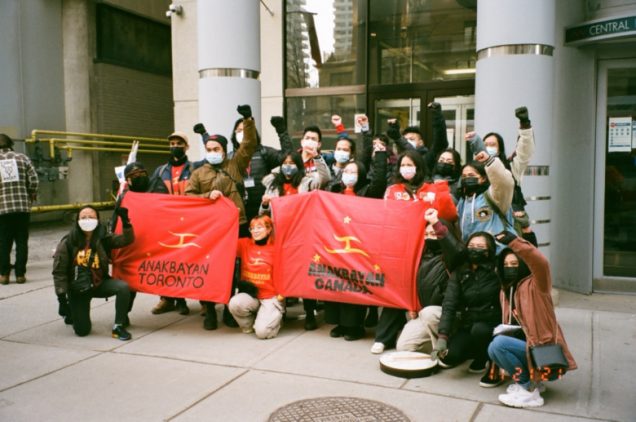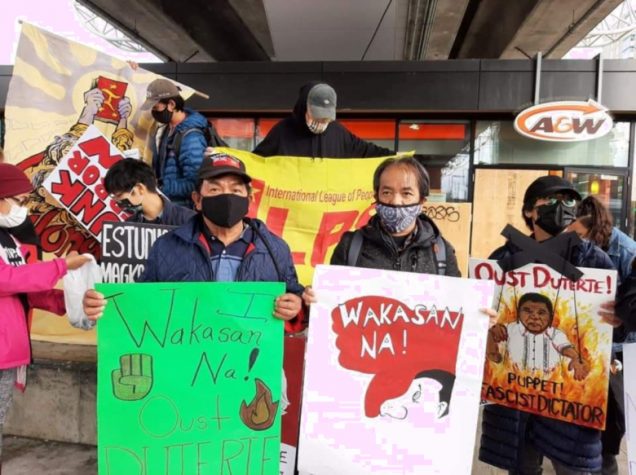Pinoys weigh in on Trudeau’s Emergencies Act
Pinoys weigh in on Trudeau’s Emergencies Act
Some draw similarities to anti-terror, human rights abuses in PH

Youth group Anakbayan Toronto hold a protest rally in front of the Philippine Consulate Generate in Toronto in November 2021 during the Anakbayan Canada Congress. The Toronto chapter of the youth advocates for national freedom and genuine democracy in the Philippines. Photos supplied
February 23, 2022
By Veronica Silva Cusi
The Philippine Reporter
LJI Reporter
Prime Minister Justine Trudeau on February 23 revoked the Emergencies Act, which was invoked for the first time on February 14 to give “more tools” to law enforcers to safeguard public safety and the economy from “illegal protests” stemming from anti-vaccination mandate.
But Pinoy Canadians are on their toes, weighing in on the 1998 federal law that was intended to be used in case of “national emergency.”
Speaking after the announcement made by key security, public safety, and legal officials, Trudeau said invoking the Act gives law enforcers “more tools to restore order” where there are “illegal and dangerous activities, such as blockades and occupations as seen in Ottawa, the Ambassador Bridge and elsewhere.”
He said he spoke with the opposition leaders and consulted with premiers from provinces and territories before invoking the Act.
Some Pinoy groups and individuals are concerned about what the Act may mean to Canadians’ rights and drew parallelism between threats to human rights here in Canada and the Philippines.
In a statement to The Philippine Reporter, progressive organization BAYAN-Canada said it is “concerned” about Canada invoking the Emergencies Act.
“We hope to not compare this to the Anti-Terrorism Act of 2020, where political dissent is being seen as “terrorism” under President Rodrigo Duterte,” the statement read. “Any emergency act that is being declared by any country in the world can potentially curtail democratic spaces and is prone to human rights violations.”
BAYAN-Canada said they are in agreement with the International League of Peoples’ Struggle which noted, in a statement last February 15, the presence of “right-wing forces” in the protests.
While the protests bring light to legitimate issues on pandemic, ILPS called attention to the “fundamental root of the problems — the ongoing crisis of capitalism and the imperialist system where the people … are abandoned in a furious chase for profits.”
BAYAN-Canada said it supports ILPS’ call to address the issues raised in the protests, such as support for frontline workers, decent working conditions and salaries, paid sick leaves, adequate protection at work, and regressive immigration and refugee policies. These issues, said BAYAN-Canada, affect racialized communities in Canada.

Community organizer Chris Sorio (centre) is concerned about the implications of the Emergencies Act in future protest actions. In this photo from September 2021, he is protesting with fellow kababayans in Vancouver, B.C. on the occasion of the 49th anniversary of the declaration of Martial Law in the Philippines. Sorio was a Martial Law detainee.
Chris Sorio, a Vancouver-based kababayan who has been organizing protests to call attention to the rights of foreign workers and racialized groups in Canada, and alleged human rights abuses in the Philippines is worried about the implications of the Act on future protest actions.
He said now that the Act has been invoked, community organizers must study the details of the Act and its implications on the right to organize protest actions.
“Yung mga gustong mag demonstrate tungkol sa immigration status ma-apektuhan ba sila nito? Tayong gusto mag-de-demonstrate tungkol sa mga human rights abuses sa Pilipinas, baka ma-apekuthan tayo nito. (Those of us who would like to demonstrate against immigration status [in Canada], and human rights abuses in the Philippines, will we be affected by the Act?),” said Sorio in a phone interview with TPR.
He noted that the protests in Ottawa have shown that the deadline for protest actions can be extended indefinitely.
“As a community organizer, ang tanong ko: bakit inabot ng tatlong linggo bago i-disperse (my question is: Why did it take three weeks for the protest action to be dispersed?” Sorio said.
“Kung halimbawa ang mga nag-demonstrate eh mga people of colour, o Indigenous Peoples, aabutin ba ito ng tatlong linggo na naka-kampo sa labas ng Parliament? (If the protest action had been led by people of colour or Indigenous Peoples, do you think the occupation in front of Parliament Hill would have lasted three weeks?) I don’t think so,” he added.
Police in Ottawa, Ont. started apprehending protestors only on February 18, days after the Emergencies Act was invoked. The border blockade at Ambassador Bridge in Windsor, Ont., reportedly cost billions of dollars to the economies of the US and Canada, took six days to be cleared and shortly before the Act was invoked.
Pinoy youth in Canada also raised concerns about the implications of the Act.
In a reply to TPR, Anakbayan Toronto, said: “We also remain skeptical of any ‘emergency’ mandates that enforce policing could (and historically has been) be used to suppress more progressive demonstrations from progressive movements. In turn, the Act threatens to reduce “rights to assemble and civil liberties”
On February 13, the youth group hosted an online chat to offer a safe space to discuss how the trucker protests has affected the Filipino community. The overseas chapter of Filipino youth fighting for national freedom and genuine democracy said they heard the experiences of people who were on the ground, and they try to understand why people were protesting.
Like BAYAN-Canada, Anakbayan Toronto is wary of any law – whether in Canada or the Philippines — that may curtail freedoms.
“The freedom of expression is limited in the Philippines by way of red-tagging towards critical voices, and policies such as the NTF-ELCAC [National Task Force to End Local Communist Armed Conflict], speech in Canada is limited by the Emergencies Act, although we acknowledge the vast difference in material conditions and the ways that the government chooses to put down a protest in their respective countries,” said Al Quinn Alquinto, Anakbayan Toronto secretary-general, in an email reply to TPR.
Like Sorio, Anakbayan Toronto noted that those adversely affected by the weeks long protests in many parts of the country were the racialized and working groups – the health care, frontline, and essentials workers, many of which are kababayans; and some truckers who were vaccinated but were prevented from making a living while borders were blocked.
Charter of Rights
Pinoy-Canadians are not alone in questioning how the law will affect Canadians’ civil liberties.
The Canadian Civil Liberties Association (CCLA) on February 17 said they would legally challenge the federal government’s use of the Emergencies Act. On February 21, when Ottawa was cleared of demonstrators and shortly before the House of Commons were to vote on the invocation, the CCLA called on the Trudeau government to revoke the declaration of emergency.
Comments (0)